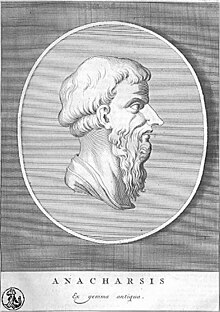Anacharsis
Anacharsis ( ancient Greek Ἀνάχαρσις Anacharsis ) is a legendary Scythian which to Solon's times (600 v. Chr.) An expedition through Greece should have done. Despite his barbaric origins, he was sometimes counted among the Seven Wise Men and is considered a pre-Socratics .
The tradition of Anacharsis
Herodotus tells in his histories that Anacharsis was the brother of the Scythian king Saulios and possessed a gentle nature and curiosity - in contrast to his people, which the Greeks always described as primitive and anti-cultural. His curiosity made him go on long journeys, which also took him to Greece. Strabo names him as the inventor of the two-fluted anchor, and the invention of the potter's wheel is often attributed to him. Herodotus notes that he found no tradition about Anacharsis among the Scythians themselves, and so his figure is likely to be (largely) mythical .
Herodotus assumes that Anacharsis is a well-known personality and reports that after his return from Greece he was killed with an arrow by his royal brother Saulios because he had celebrated a Greek mystery cult in Hylaia . Diogenes Laertios describes Anacharsis as a witty and quick-witted Scythian who fell victim to his philhellenism in his backward homeland . He also reports on Anacharsis' encounter with Solon and mentions statues of him, as well as numerous sayings ascribed to him (50 Apophthegmata ). Ephoros of Kyme is said to have counted Anacharsis to the " Seven Wise Men ". Other authors also pass on sentences that are ascribed to Anacharsis.
In ancient times , fictional letters from Anacharsis (ten pseudepigraphs ) were circulating, portraying him as a needless "noble savage" and a model of the Cynical way of life. Cicero quotes one of these letters in his conversations in Tusculum .
Literary adaptations
The name and form of Anacharsis were used again and again in later intellectual history to identify an unprejudiced, critical contemporary. Lukian of Samosata used him as a spokesman in his mocking dialogue Anacharsis about ancient sports.
In the 18th century, the literary fiction of the “younger Anacharsis” was linked to the figure of Anacharsis . The Abbé and scholar Jean-Jacques Barthélemy made him the hero of his great travel novel published in 1788 under the title Voyage du Jeune Anacharsis en Grèce , which decisively shaped the image of Greece of his time. Following on from this, Wilhelm Walter published the historical novel The Anacharsis of the Thirteenth Century in 1845 . Even Karl Gutzkow continued the literary tradition of the younger Anacharsis 1832 travel sketches, which he entitled From the travel diary of the youngest Anacharsis in the morning paper for educated stands, in his 1839 sketch book under the title The youngest Anacharsis published.
Inspired by the novel by Barthélémy, the Prussian baron Johann Baptist Cloots (1755–1794), an enthusiastic supporter of the French Revolution , adopted the name Anacharsis Cloots . The artist Joseph Beuys chose this name as his alter ego , which he underscored by merging their two names to "JosephAnacharsis Clootsbeuys".
Editions and translations
- Bolko Fietz: The wisdom of the Scythian. Parables and thoughts of the nomad prince Anacharsis. With illustrations by Alexander König. Vokal Verlag, Leipzig 2012, ISBN 978-3-9813036-6-7
- Georg Luck (ed.): The wisdom of dogs. Texts of the ancient Cynics in German translation with explanations (= Kröner's pocket edition . Volume 484). Kröner, Stuttgart 1997, ISBN 3-520-48401-3 , pp. 287-291.
- Franz Heinrich Reuters (ed.): The letters of Anacharsis. Greek and German. Akademie Verlag, Berlin 1963.
literature
- Jan Fredrik Kindstrand: Anacharsis . In: Richard Goulet (ed.): Dictionnaire des philosophes antiques. Volume 1, CNRS, Paris 1989, ISBN 2-222-04042-6 , pp. 176-179.
- Jan Fredrik Kindstrand: Anacharsis, the legend and the Apophthegmata. Almqvist & Wiksell, Uppsala 1981, ISBN 91-554-1165-7 .
- Thomas A. Schmitz : Anacharsis. In: Peter von Möllendorff , Annette Simonis, Linda Simonis (ed.): Historical figures of antiquity. Reception in literature, art and music (= Der Neue Pauly . Supplements. Volume 8). Metzler, Stuttgart / Weimar 2013, ISBN 978-3-476-02468-8 , Sp. 69-76.
- Charlotte Schubert : Anacharsis the Wise. Nomade, Skythe, Greek (= Leipzig studies on classical philology. Volume 7). Narr, Tübingen 2010, ISBN 978-3-8233-6607-2 .
- Claudia Ungefehr-Kortus: Anacharsis, the type of the noble, wise barbarian. A contribution to understanding the Greek experience of foreignness. Peter Lang, Frankfurt am Main / New York 1996, ISBN 3-631-30411-0 .
Footnotes
- ↑ Herodotus, Historien 4,46; 4.76 f.
- ↑ Herodotus, Historien 4,46; see. Plato , Politeia 10,600a.
- ↑ Herodotus, Histories 4.76.
- ↑ Diogenes Laertios 1.101 ff.
- ↑ Diogenes Laertios 1.41.
- ↑ Aristotle , Nicomachean Ethics 10,6,1176b, 33; Athenaios , Deipnosophistai 10,437 f .; 10.445 f .; Claudius Aelianus , Colorful Story 2.41.
- ^ Cicero, Conversations in Tusculum 5.90.
- ↑ Lukian von Samosata , Erwin Steindl: Scytharum colloquia quae inscribuntur Toxaris, Scytha, Anacharsis. Teubner Verlagsgesellschaft, Leipzig 1970.
- ↑ Guido de Weert (preface): Anacharsis Cloots. The orator of the human race. Boss, Kleve 1988, p. 7.
| personal data | |
|---|---|
| SURNAME | Anacharsis |
| ALTERNATIVE NAMES | Ἀναχαρσις (Greek); Anacharsis |
| BRIEF DESCRIPTION | Skythe |
| DATE OF BIRTH | 6th century BC Chr. |
| DATE OF DEATH | 5th century BC Chr. |
